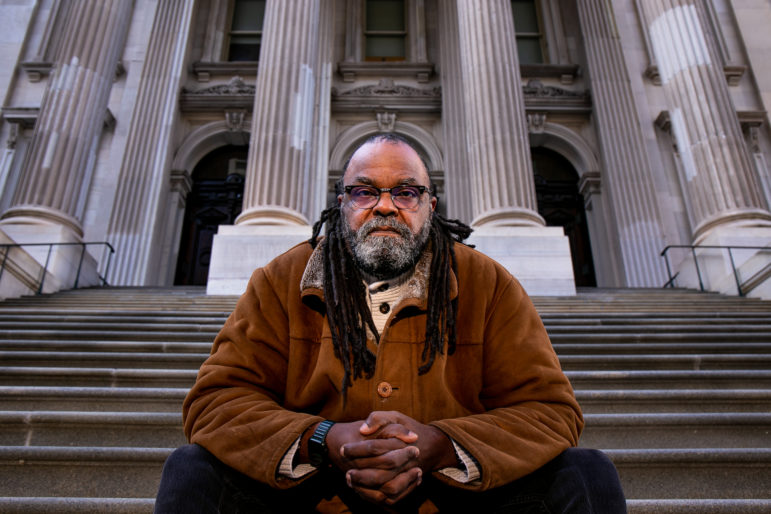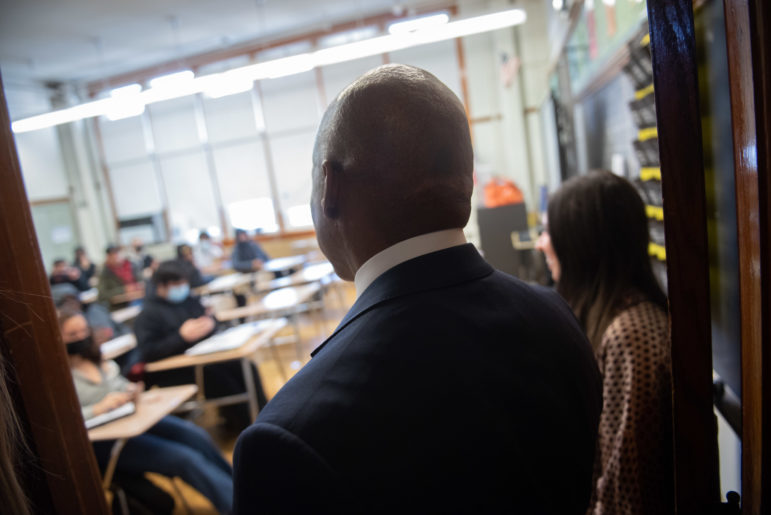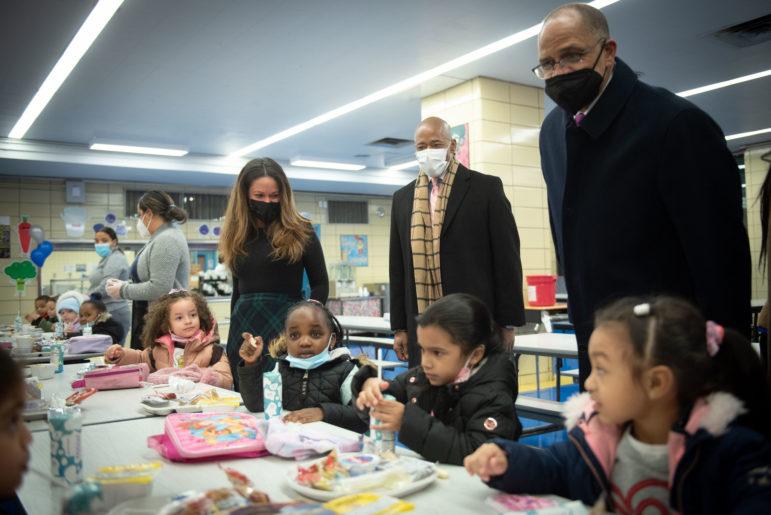New York legislators have until June 30 to decide if they want to extend mayoral control again, and if so, for how long. If they choose not to extend, they need to come up with a new system, since few legislators seem interested in reverting to the school board structure that was in place prior to 2002.

Adi Talwar
Tom Sheppard, the only elected member of the city’s Panel for Educational Policy, at the steps of the Tweed Courthouse building.Tom Sheppard represents roughly 2 million fellow parents in New York City on the Panel for Educational Policy, the 15-member body that functions as the city’s school board.
The Bronx parent of three schoolchildren is the only PEP member voted in by the heads of the city’s largely parent-run Community Education Councils, and so he tries to advocate on behalf of families who have been historically disenfranchised and neglected by the education system, he said. But sometimes he feels outnumbered by the nine PEP members appointed by the mayor, and the five appointed by each respective borough president, and said he doesn’t feel like he alone can represent the diverse needs of all families.
Sheppard wishes there were a larger proportion of PEP members who were elected to represent parents: like six total representatives, elected by the community education councils in each borough and one representing the citywide council for special education.
“You cannot have a single parent that’s supposed to represent everybody in the system,” Sheppard said. “It’s impossible for it to be truly reflective of all the parents in the city and the needs that exist in different places.”
New York City’s school system has operated under mayoral control for the last 20 years, where the mayor appoints and has the power to fire the schools chancellor and nine of the 15 members of the PEP. The state legislature granted a term of control to former Mayor Michael Bloomberg in 2002, after years of criticism about the former seven-member school board model–with two members appointed by the mayor and one by each borough president–that suffered from mismanagement allegations.
The legislature has extended mayoral control every couple of years since it was initially granted two decades ago. While Gov. Kathy Hochul backs renewing it once again, state lawmakers did not extend the policy in the state budget they approved earlier this month. They now have until the end of June to make a decision, when the current term of mayoral control is set to expire. Legislators need to decide if they want to extend it again, and if so, for how long. If they choose not to extend, they need to come up with a new system, since few legislators seem interested in reverting to the school board structure that was in place prior to 2002.
Criticism of the mayor’s executive role in the current system has gained traction recently, too: At a hearing hosted by the education committees of the state Senate and Assembly on March 4, the majority of people who testified said they were against mayoral control.
“Mayoral control does not and cannot work because the decision-making power lies with one person at the end of the day,” said Tajh Sutton–the president of Community Education Council 14 in Brooklyn and the director of the youth advocacy organization Teens Take Charge–at the March 4 hearing.
Sutton’s criticism is a common one lodged against mayoral control: that it puts power in the hands of too few stakeholders, and that families, educators and students do not have enough opportunity to participate in school-policy decisions. “What I’ve seen throughout the pandemic is a very small minority of parents who are very well organized being able to make and impact a lot of really important decisions,” Sutton said.
In New York, mayoral control has led to controversial policy decisions. Under Michael Bloomberg, that included closing low-performing schools and expanding the charter network. While Bill de Blasio was largely heralded for his landmark Universal Pre-k program, some of his other educational goals were met with backlash, including his failed effort to eliminate the single admissions exam for the city’s specialized high schools.
Most mayors in the United States do not have control over their city’s schools. Los Angeles, the nation’s second largest school district after New York, has an elected school board. Last year, Chicago voted to transition to an elected school board by 2026, bringing an end to the city’s 150-year stint of mayoral control.
Stakeholders this year have proposed numerous alternatives to New York City’s current model, including: reconstructing the PEP so the mayor doesn’t appoint the majority of members; giving PEP members set terms so they have more autonomy after they are appointed; making the schools chancellor an elected position instead of a mayoral appointee; and even giving control of schools over to the New York City Council.
Lawmakers say their ears are still open to suggestions. Assemblyman Michael Benedetto, chair of the State Assembly’s committee on education, said the legislature plans to discuss mayoral control when they reconvene on Tuesday.
“It was blatantly obvious from what we heard that the vast majority of them wanted us to keep it out of the budget,” said Benedetto, referring to those who testified at the hours-long public hearing on mayoral control last month. “After that, their suggestions were basically all over the place from letting mayoral control expire, to keeping mayoral control just the way it is, to keeping mayoral control but with some tweaks to it.”

Michael Appleton/Mayoral Photography Office
Mayor Eric Adams stands in the doorway of his old high school classroom at Bayside High School in Queens, during a visit to call for continued Mayoral control schools on March 8.
Giving Adams a shot
Mayor Eric Adams and NYC Schools Chancellor David Banks have asked the legislature for four more years of mayoral control, pointing both to the educational improvements the city has seen over the last two decades as well as the precarious position students are in after two years of pandemic disruptions—which would have been worse had mayoral control not been in place, Adams argues.
“Because we had mayoral accountability, we were able to make split second decisions and move our school system and families in the right direction during the pandemic,” Adams said during a press briefing in March, where he and Banks made their case for renewal. Both are products of the city’s public schools themselves, and Adams is the first Black mayor to hold office while mayoral control is in place.
“We know what it was like back in the days prior to 2002. When I was in Albany and voted for mayoral control, we had a school board system with 32 Community School Boards filled with patronage, corruption, infighting, failing our students,” the mayor said. “We can’t go backwards. We have to build on accountability.”
Graduation rates have indeed improved since 2002: In June of that year, just 49.1 percent of the city’s high school students graduated within four years; in 2017, it was 78.5 percent of students.
Proponents of mayoral control say the system allows the city to apply the same standards to all students, regardless of the district in which they reside. They also point to financial advantages, like better bargaining power and the political incentive the system gives the mayor to fund schools. Sheppard, who opposes mayoral control, said he does recognize some value in a “centralized system.”
“If you look at it in terms of things like purchasing power, you generally tend to get a better deal on something when you’re buying it in bulk,” Sheppard said. “If you have 32 school districts doing their own thing, it does become a bit of an administrative headache. Also, I think that there’s some value in having a single set of rules that we all operate under.”
The city’s business sector has historically been a proponent of mayoral control, arguing it ensures a better-trained workforce.
“As employers who depend on the city’s schools to prepare students for college and careers, we have a stake in the system and believe that any dilution of mayoral control would jeopardize the progress made over the past two decades,” Kathryn Wylde, president and CEO of the Partnership for New York City, which represents dozens of the city’s major businesses and corporations, said in a March letter calling for the state to renew the policy.
Assembly Education Chair Benedetto said he is in favor of extending mayoral control himself, but with some changes that give parents more opportunity to participate in decisions. He said he favors mayoral control because there is someone to blame when things go wrong.
“The positive side is that we have somebody to point the finger at if we don’t like what’s going on, and we can blame him,” Benedetto said. “The mayor is ultimately responsible and that will weigh upon us when we decide who the next mayor should be.”
David Bloomfield, an education professor at Brooklyn College, said he wishes the state legislature would take his proposal for “city control” seriously, where he envisions the City Council would have to approve the chancellor’s appointment and participate in policy decisions. But since he doesn’t think the legislature will implement his idea, Bloomfield supports an extension of mayoral control.
Some also say newly-elected Mayor Adams deserves a chance to lead the school system, and that criticism of mayoral control under past administrations should be reserved until after Adams gets his shot. The mayor has made several big education-related announcements in recent weeks—unveiling his controversial plan to expand the Gifted and Talented program, as well as a $50 million private-sector investment in charter schools—no doubt an effort to strengthen his case before Albany.
“A four-year extension of this transformational policy will allow me four years to do what I know needs to be done based on my time as a student, as a law enforcement officer, as a senator, and as a borough president,” Mayor Eric Adams said during the first 10 minutes of the March 4 state legislative hearing on mayoral control.
Adams left the hearing, however, prior to listening to stakeholders’ testimonies or taking questions from legislators: That day, he was headed to announce the end of the mask mandates in schools.

Michael Appleton/Mayoral Photography Office
Mayor Adams and Chancellor Banks visit Concourse Village Elementary School in The Bronx on Jan. 3, 2022.‘Inherently undemocratic’
Most other stakeholders who testified at the virtual hearing earlier this month said they are dissatisfied with the current system and asked policymakers for something new, including the President of the United Federation of Teachers, Michael Mulgrew, and NYC Public Advocate Jumanee Williams. Of the nine people who responded to a City Limits survey, eight said they were opposed to mayoral control of schools. Only one said they were in favor of an extension of mayoral control.
Critics say the system does not offer enough opportunities for communities and families to participate in decisions about educational policy.
“The goal is to have the best school system going forward: one that engages parents as opposed to externalizing them, which is one of the causes of families leaving the city’s public schools,” said State Sen. John Liu, chair of the standing committee on education. “The feeling of exclusion seems to have become more pronounced in more recent years, even before COVID.”
The system allows the mayor to make political decisions that aren’t always in the best interest of students, families or educators, critics argue. These folks say their issues have been going on for 20 years and have nothing to do with the Adams administration in particular.
“If we continue to give mayoral control a try just because we have a new administration, the individuals and the families and the communities and the schools and the districts and the zip codes that suffered under the Bloomberg era and under the de Blasio administration will continue to suffer under the Adams administration,” Sutton said. “Not because Adams and Banks are uniquely flawed in some way, but because the system is inherently undemocratic.”
Sheppard, the only elected member of the PEP, said there is no accountability under mayoral control, since the mayor appoints a majority of the panel’s members. The PEP votes on major policy decisions proposed by the administration—including things like school closures and co-locations—and has been accused of serving merely as a “rubber stamp,” of the mayor and chancellor’s plans (though notably, the panel made the rare move of rejecting a city-proposed educational contract last month, Chalkbeat reported).
“The issue is that the mayor appoints basically a two-thirds majority of the members of the school board,” Sheppard said. “How do people that you appoint actually hold you accountable for anything? We’ve just seen a system that basically does what it wants and feels like it doesn’t have to answer to anyone.”
Unlike Benedetto––who said mayoral control provides accountability by giving voters the opportunity to vote for a different mayor if they don’t like the educational policies implemented ––Sheppard said elections are insufficient for “day-to-day” accountability, since they occur too far apart and are determined by a multitude of factors beyond education.
During his plea for an extension, Banks acknowledged that sometimes families don’t feel involved in decisions under mayoral control, and pledged to do better.
“We’ll be engaging with families in policy creation and implementation procedures at all levels,” Banks said during the March 4 hearing. “We are also going to be mindful and intentional about the importance of timeliness in our engagement. I don’t want to create policy where families feel that they have not been part of the process. That will not happen with me as chancellor. I just got here, but I am fully committed to this.”
Benedetto said that prior to the March 4 hearing, he thought it was likely mayoral control would be extended. But he said he’s no longer sure after hearing from stakeholders and colleagues who expressed their concerns.
“Coming out of the hearings and talking with some of my members, I have heard many people who had reservations about giving the mayor complete control of our system,” Benedetto said in an interview with City Limits. “So would you say that the mayoral control of the school system in the city of New York is at risk? I would say that that would be one of the topics we will discuss and there is that possibility.”
Liu said “there are no preconceived notions” about how schools should proceed at this point.
“There were some good suggestions about how the governance can be improved that will lead to more accountability from City Hall and the Department of Education,” Liu said. “There’s still quite a bit of time before the June 30 sunset and quite a bit of time before school starts in September. There’s no need to rush a decision and our ears are open to more suggestions, criticisms.”
Please share your opinions about school government in NYC and what you think the state legislature should do by filling out this survey.










6 thoughts on “To Renew or Rebuild? Albany Considers Alternatives to Mayoral Control of NYC Schools”
Mr Sheppard was elected by the Presidents of the 32 local Community Education Council. Presidents of the Citywide Councils were not permitted to vote. In that group there are 160,000 students with ELL/MLL designations, 26,000 students from D 75 and 250,000 students with IEPs. The Chancellor could chage this by allowing those Council members to be part of any voting process. All the Chancellor has to do is create a regulation to give those council, and the parents that they represent, s voice in selecting a parent member of the PEP.
Sad to say but this is all politics I feel is not about our students or the school or education.
State Sen John Liu, there is NOT quite a bit of time until June 30th and the start of school in September. Thinking this way leaves our kids behind every year.
And the idea that the Mayor of the City of NY has the time or bandwidth to also be in charge of the largest school system in the country is CRAZY! There are better ways to serve the incredible children of our beautiful city.
We need an audit of 20 years of mayoral control. Follow the money and assess the effectiveness or lack thereof of the corporate led education “reform” policies that would never have passed muster if they had to be approved by parents and school staff.
The NYC Coalition to Finally End Mayoral Control https://www.nycmayoralcontrolnot.org/ asked legislators for a bill calling for such an an audit but not a single Senator or Assembly Person took it on.
Instead of childish political charades how about holding mayoral control and the NYS legislature accountable?
Billions of taxpayer $ have been poured into NYC schools since Bloomberg took over. Where is the assessment of the past 20 years?
This piece is weak and doesn’t delve into the real failures of mayoral control. Adams and Banks have already demonstrated an inability to implement anything effectively. Continuing mayoral control would only exacerbate the decline of the school system that began under Bloomberg. Banks has yet to say anything significant about literacy, math, other basics and dealing with the learning loss of the pandemic years. So disappointing…
We clearly need another system that grants a more collaborative role for parents, and, rushing ahead in the final days of the legislative session will not be productive. Perhaps Albany can extend for one year, appoint a commission representing all the stakeholders w/ a 1/1/23 for their recommendation- let’s get it right!!